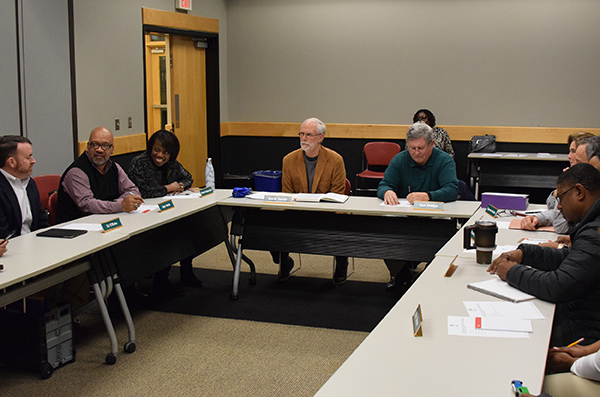The meeting of the Greensboro Criminal Justice Advisory Commission (GCJAC) held Thursday, Jan. 17 was surprising calm and businesslike considering the fact that two high profile members of the commission had been removed by the City Council on Tuesday night.
GCJAC met in the Central Library and didn’t waste much time in getting down to business. Chair David Sevier began by reading the responsibilities of the commission which include: monitoring, reviewing and evaluation criminal justice issues, working with the Greensboro Police Department to identify concerns, trends and opportunities, providing input to the police on addressing issues, working with the city staff and police on recommendations and follow-up, serving as the primary community education and outreach group, providing the City Council with regular updates and working with the Police Community Review Board (PCRB) on police complaints.
In short, it seems that anything involving the police in Greensboro is within the purview of GCJAC.
Commissioner Kay Brown asked how they could provide community feedback if everything they did was confidential.
City Councilmember Michelle Kennedy, who is the Council liaison to GCJAC and before being elected to the City Council was a member of the Police Citizens Review Board (PCRB), explained that the only confidential issues the commission would likely deal with were the complaints that came to the PCRB where confidential police personnel material would be examined, other material was available to the public and could be discussed with anyone they wished.
Kennedy also explained why two commissioners were removed. She said that being appointed to a board or commission comes with responsibilities and one of those is to attend meetings. The two commissioners were removed by the City Council because they had not attended the required training sessions or recent meetings.
Police Chief Wayne Scott appeared before the commission and asked it to assist the police in its review of restraint devices in light of the recent incident involving the “Ripp Hobble” which was listed as a contributing factor in the death of Marcus Deon Smith in September.
Scott said that the device had been in use by the police since 1999 and the major concern about the device was that if it was improperly used it could cause asphyxiation. Scott noted that Smith died of cardiac arrest which in the past had not been associated with this device.
Scott said that the police had to restrain people and the police task force was investigating the best practices used nationwide to restrain individuals. He asked for the commission to work with the police task force to provide input from their perspective.
Mayor Nancy Vaughan had first suggested to the Rhino Times that investigating the Ripp Hobble would be a good task for GCJAC. When Commissioner Tom Phillips was asked if GCJAC had that on its agenda he said they could investigate it but it would be better if they were asked to do so.
The outcome of that public exchange was that Scott came to the meeting and asked GCJAC to join in the investigation.
GCJAC also discussed the best way to move forward with its proposed education program in the schools designed to concentrate on the rights and responsibilities of the police and of a person stopped or questioned by the police.
Commissioner Jaye Webb said they should make an effort to produce the material that the students were asking for rather than what they thought the students needed.
There was also a discussion of the PCRB and how that would function as a subcommittee of the GCJAC. Phillips said that the PCRB still existed.
At the City Council meeting on Tuesday there was a discussion of phasing out the PCRB since no one seemed satisfied with it. But Phillips noted that as of now the PCRB still existed and would likely investigate the one case that was coming before it later this year.

